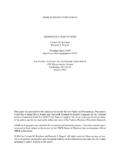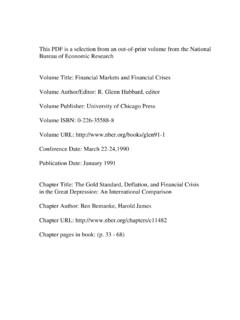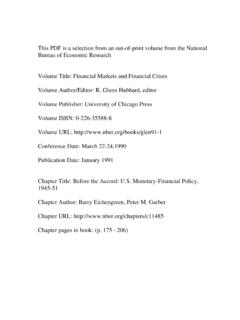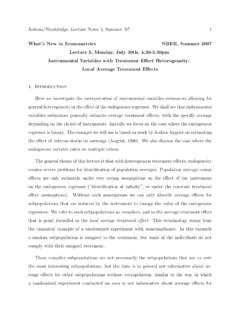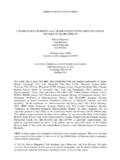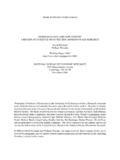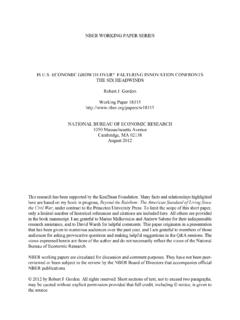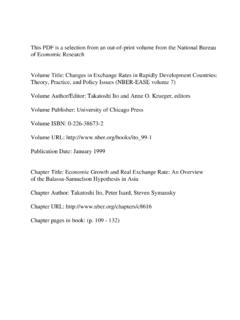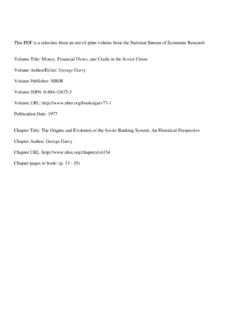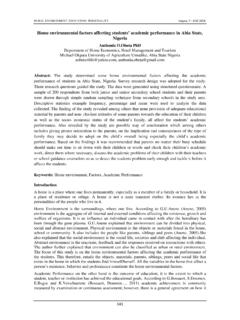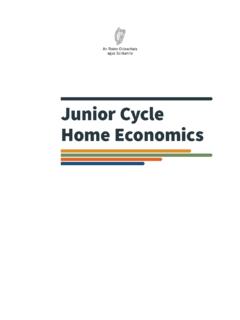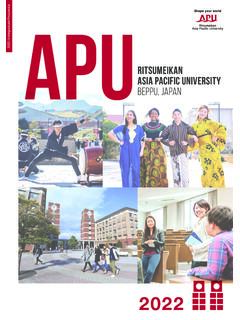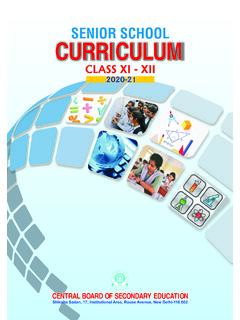Transcription of LEARNING DURING THE COVID-19 PANDEMIC - National …
1 NBER WORKING PAPER SERIESLEARNING DURING THE COVID-19 PANDEMIC :IT IS NOT WHO YOU TEACH, BUT HOW YOU TEACHG eorge OrlovDouglas McKeeJames BerryAustin BoyleThomas DiCiccioTyler RansomAlex Rees-JonesJ rg StoyeWorking Paper 28022 BUREAU OF economic RESEARCH1050 Massachusetts AvenueCambridge, MA 02138 October 2020 The views expressed herein are those of the authors and do not necessarily reflect the views of the National Bureau of economic working papers are circulated for discussion and comment purposes. They have not been peer-reviewed or been subject to the review by the NBER Board of Directors that accompanies official NBER publications.
2 2020 by George Orlov, Douglas McKee, James Berry, Austin Boyle, Thomas DiCiccio, Tyler Ransom, Alex Rees-Jones, and J rg Stoye. All rights reserved. Short sections of text, not to exceed two paragraphs, may be quoted without explicit permission provided that full credit, including notice, is given to the DURING the COVID-19 PANDEMIC : It Is Not Who You Teach, but How You TeachGeorge Orlov, Douglas McKee, James Berry, Austin Boyle, Thomas DiCiccio, Tyler Ransom,Alex Rees-Jones, and J rg StoyeNBER Working Paper No. 28022 October 2020 JEL No. A2,A22,I21 ABSTRACTWe use standardized end-of-course knowledge assessments to examine student LEARNING DURING the disruptions induced by the COVID-19 PANDEMIC .
3 Examining seven economics courses taught at four US R1 institutions, we find that students performed substantially worse, on average, in Spring 2020 when compared to Spring or Fall 2019. We find no evidence that the effect was driven by specific demographic groups. However, our results suggest that teaching methods that encourage active engagement, such as the use of small group activities and projects, played an important role in mitigating this negative effect. Our results point to methods for more effective online teaching as the PANDEMIC OrlovCornell University109 Tower Rd.
4 ,Uris Hall, Room 402C Ithaca, New McKeeCornell University110 Cobb StIthaca, NY BerryDepartment of Economics University of Delaware BoyleDepartment of Economics Pennsylvania State University DiCiccioDepartment of Social StatisticsSchool of Industrial and Labor RelationsCornell RansomDepartment of EconomicsUniversity of Oklahoma158 CCD1308 Cate Center DriveNorman, OK Rees-JonesUniversity of PennsylvaniaThe Wharton SchoolDepartment of Business Economics and Public Policy3rd Floor, Vance Hall3733 Spruce StreetPhiladelphia, PA 19104-6372and rg StoyeDepartment of Economics Cornell the COVID-19 PANDEMIC arrived in the United States in the spring of 2020, most colleges and universities switched from in-person teaching to remote instruction.
5 As the PANDEMIC continues to unfold, even those institutions that brought students back to campus in the Fall 2020 term have had to offer substantial numbers of courses online. For many institutions, this transition to online LEARNING was conducted on short notice, with little planning or prior experience to guide the transitions. For educational institutions to be successful in providing students with the best possible LEARNING experience in this new environment , it is essential to understand which aspects of pedagogy proved to be most effective and whether specific groups of students were more vulnerable in the forced switch to remote instruction, so that they can be provided with additional support.
6 Investigating how different aspects of teaching affect the LEARNING of different types of students is often challenging. Typically, our best measure of LEARNING in a course is the final exam, and these exams can differ in difficulty or not evaluate the same course LEARNING goals from semester to semester. In the PANDEMIC , these challenges are further complicated by changes in the way final exams are often administered ( , going from a closed book proctored exam taken on campus to an open book unproctored exam taken online in a student s home ). We circumvent this issue by analyzing data from seven intermediate-level economics courses in which student LEARNING was measured using standard multiple-choice assessments developed at Cornell University as a part of the Active LEARNING Initiative (1), following the procedure outlined in (2).
7 The Intermediate Economics Skills Assessment Microeconomics (IESA-Micro, 31 questions), the economic Statistics Skills Assessment (ESSA, 20 questions), the Applied Econometrics Skills Assessment (AESA, 24 questions), and the Theory-based Econometrics Skills Assessment (TESA, 21 questions). Each of the assessment questions are mapped to explicit course LEARNING goals, and assessments were administered as low-stakes tests just prior to or just after the final class meeting of each semester. In this paper, we compare student performance on standard assessments in Spring 2020 to student performance in the same courses in either Fall or Spring 2019 to estimate the impact of the emergency switch to remote instruction induced by the COVID-19 PANDEMIC .
8 Using these data, we address three questions: First, we examine how end-of-semester knowledge was influenced by the measures taken in Spring 2020. Second, we assess whether certain groups of students were more affected by the And third, we look at whether the use of specific teaching methods resulted in a more successful transition to remote teaching. Our data were collected DURING the Spring 2019, Fall 2019, and Spring 2020 semesters at four R1 PhD-granting institutions. Student data include the performance on the multiple-choice assessments and responses to a demographic questionnaire.
9 At the end of the Spring 2020 semester, instructors of the seven courses filled out a survey regarding their teaching practices before and DURING the PANDEMIC and the extent of material coverage DURING the PANDEMIC semester. All but one of the seven courses were taught by the same instructor in the pre- PANDEMIC and PANDEMIC semesters. Since each of the assessment questions is mapped to one or more course-specific LEARNING goals, we were able to calculate a separate subscore for the material that was taught remotely DURING the latter portion of the semester. Our analysis sample pools the students who completed the study courses with two sets of restrictions imposed: First, students must have answered survey questions on gender, ethnicity, parental education, and non-native English speaker status.
10 Response rates varied somewhat across courses, but based on administrative data, it does not look like changes in rates across semesters in the same courses were correlated with student characteristics such as GPA. Second, for students who took the assessments online, we analyze only those respondents who demonstrated some effort by spending at least five minutes on the test. Table 1 shows the proportions of students who are female, underrepresented minority (URM), first-generation collegegoers, and who are non-native English speakers in both the pre- PANDEMIC (Spring or Fall 2019) and PANDEMIC (Spring 2020) semesters.
